
Yerres Historical Society

|
Société d’Histoire d’Yerres
Yerres Historical Society |
|
|
Sous les ponts de Paris
Pour aller à Suresnes ou bien à Charenton,
Tout le long de la Seine, on passe sous les ponts. Pendant le jour, suivant son cours, Tout Paris en bateau défile L’cœur plein d’entrain, ça va, ça vient, Mais l’soir, lorsque tout dort tranquille… Sous les ponts de Paris, lorsque descend la nuit, Tout’s sort’s de gueux se faufil’nt en cachette Et sont heureux d’y trouver un’ couchette Hôtel des courants d’air, où l’on ne paie pas cher, L’parfum et l’eau, c’est pour rien, mon marquis ! Sous les ponts de Paris. À la sortie d´ l´usine, Julot rencontr’ Nini. « Ça va t´il la rouquine ? C´est ta fête aujourd´hui. « Tiens ! Prends c’ bouquet, quelqu’s brins d´ muguet, « C´est peu, mais c´est tout’ ma fortune, « Viens avec moi, j´ connais l´endroit « Où l´on n´ craint mêm’ pas l´ clair de lune. » Sous les ponts de Paris, lorsque descend la nuit Comme il n´a pas d´ quoi s´ payer une chambrette, Un couple heureux vient s´aimer en cachette, Et les yeux dans les yeux, faisant des rêves bleus, Julot partag´ les baisers de Nini Sous les ponts de Paris. Rongée par la misère, chassée de son logis, L’on voit un’ pauvre mère avec ses trois petits, Sur leur chemin, sans feu, sans pain, Ils subiront leur sort atroce. Bientôt la nuit, la maman dit : « Enfin ils vont dormir mes gosses. » Sous les ponts de Paris, un’ mère et ses petits Viennent dormir là tout près de la Seine. Dans leur sommeil ils oublieront leur peine. Si l’on aidait un peu, tous les vrais miséreux, Plus de suicid’s ni de crim’s dans la nuit Sous les ponts de Paris ! |
Under the Bridges of Paris
To go to Suresnes or to Charenton,
All along the Seine, one passes under the bridges. During the day, following its course, All Paris in boat passes thru. The heart full of spirit, it goes and comes, But in the evening, when all is quiet… Under the bridges of Paris, when night falls, All sorts of beggars sneak in And are happy to find a place to sleep Hotel of the draughts, where one does not pay expensive, Perfume and water, it's free, my Lord! Under the Bridges of Paris. At the exit of the factory, Julot meets Nini. "How are you, redhead? It's your birthday today. "Here! Take this bouquet, some sprigs of lily of the valley, "It's not much, but it's my entire fortune, "Come with me, I know the place "Where you don't even fear the moonlight." Under the bridges of Paris, when night falls As he has no money to buy a room, A happy couple comes to love each other in secret, And the eyes in the eyes, making blue dreams, Julot shares Nini's kisses Under the bridges of Paris. Gnawed by misery, driven out of her home, We see a poor mother with her three little ones, On their way, without fire, without bread, They will suffer their atrocious fate. Soon the night, the mother says: "At last they will sleep, my kids." Under the bridges of Paris, a mother and her little ones Come to sleep there near the Seine. In their sleep they will forget their pain. Should we help a little all the real poor people, No more suicides or crimes in the night Under the bridges of Paris! |
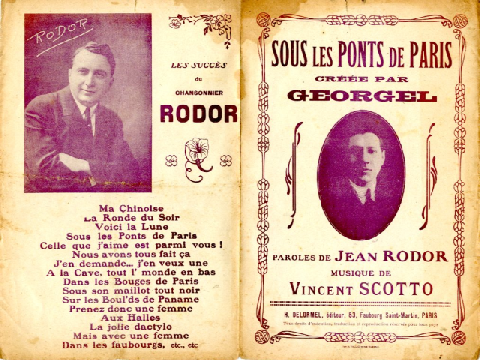
|
|
|
Quand Madelon…
Pour le repos, le plaisir du militaire,
Il est là-bas, à deux pas de la forêt. Une maison aux murs tout couverts de lierre, "Aux Tourlourous" c’est le nom du cabaret. La servante est jeune et gentille Légère comme un papillon. Comme son vin son œil pétille, Nous l’appelons la Madelon. Nous en rêvons la nuit, nous y pensons le jour, Ce n’est que Madelon, mais pour nous c’est l’amour ! Quand Madelon vient nous servir à boire, Sous la tonnelle, on frôle son jupon, Et chacun lui raconte une histoire, Une histoire à sa façon. La Madelon pour nous n’est pas sévère, Quand on lui prend la taille ou le menton Elle rit, c’est tout l’ mal qu’ell’ sait faire Madelon, Madelon, Madelon ! Nous avons tous au pays une payse Qui nous attend et que l’on épousera. Mais elle est loin, bien trop loin pour qu’on lui dise Ce qu’on fera quand la classe rentrera. En comptant les jours on soupire, Et quand le temps nous semble long, Tout ce qu’on ne peut pas lui dire, On va le dire à Madelon. On l’embrass’ dans les coins. Elle dit « veux-tu finir… » On s’ figur’ que c’est l’autr’, ça nous fait bien plaisir. Un caporal en képi de fantaisie S’en fut trouver Madelon un beau matin, Et fou d’amour, lui dit qu’elle était jolie Et qu’il venait pour lui demander sa main. La Madelon, pas bête, en somme, Lui répondit en souriant : « Et pourquoi prendrais-je un seul homme, « Quand j’aime tout un régiment ? « Tes amis vont venir. Tu n’auras pas ma main, « J’en ai bien trop besoin pour leur verser du vin ! » |
When Madelon…
For the rest, the pleasure of the soldier,
It's over there, a stone's throw from the forest. A house with walls all covered with ivy, "To Infantrymen" is the name of the cabaret. The maid is young and kind Light as a butterfly. Like her wine her eye sparkles, We call her the Madelon. We dream of her at night, we think about her in daytime, She is only Madelon, but for us she is love! When Madelon comes to serve us a drink, Beneath the arbor, we brush against her petticoat, And everyone tells her a story, A story in his own way. The Madelon for us is not severe, When we take her waist or her chin She laughs, that's all the harm she can do Madelon, Madelon, Madelon! We all have a girl back home Who is waiting for us and whom we will marry. But she's far, far too far away for us to tell her What we will do when the class returns. As we count the days we sigh, And when the time seems long, All that we can't tell her, We'll tell Madelon. We kiss her in the corners. She says "please stop…" We imagine that it's the other, it makes us happy. A corporal with a fancy kepi Went to find Madelon one morning, And mad with love, told her she was pretty And that he had come to ask for her hand. The Madelon, being no fool, all in all, Answered with a smile: "And why should I marry one man, "When I love a whole regiment? "Your friends will come. You won't have my hand, "I need it too much to pour them wine!" |
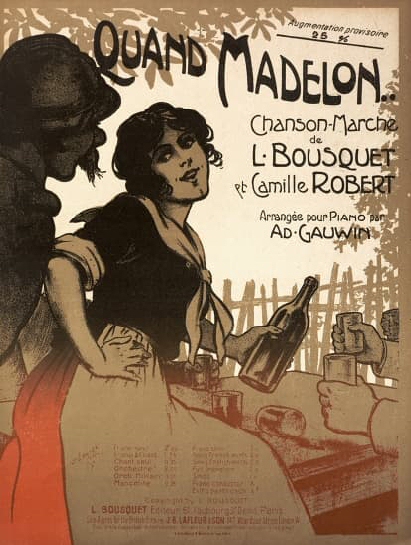
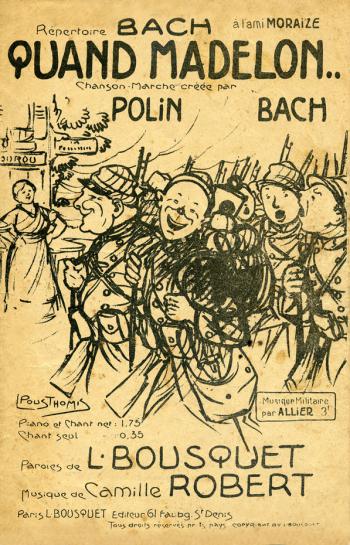
|
|
|
Le cri du Poilu
V’là plus d’une année
Que dans les tranchées Nos petits soldats, Loin de tout l’ monde, sont là-bas. Seuls dans la bataille, Ils brav’nt la mitraille, Ils n’ pensent plus à rien Qu’à tirer sur ces sal’s Prussiens. Mais quand ils sont au r’pos Et qu’ils n’ont plus d’ flingot Couchés sur l’ dos, À nos poilus qui sont su’ l’ front Qu’est-c’ qu’il leur faut comm’ distraction ? Une femme, une femme ! Qu’est-ce qui leur f’rait gentiment Passer un sacré bon moment ? Une femme, une femme ! Au lieu d’ la sal’ gueul’ des Allemands, Ils aim’raient bien mieux certain’ment Une femme, une femme ! Cré bon sang ! Qu’est-c’ qu’y donn’raient pas Pour t’nir un moment dans leurs bras Une femme, une femme ! Quand, en ribambelle, Ils bouff’nt la gamelle, C’est vite avalé En deux temps, ça n’a pas traîné. Penchés sur la paille, Allons-y, ils bâillent, Se f’sant, nous l’ tenons, Presque tous la mêm’ réflexion. Et dans ces moments-là À quoi pens’nt-ils tout bas ? Ne cherchez pas ! À nos poilus qui sont su’ l’ front Qu’est-c’qu’il leur faut comm’ distraction ? Une femme, une femme ! Quand ils ont bouffé leur rata, Qu’est-c’ qu’ils demand’nt comm’ second plat ? Une femme, une femme ! Sapristi, pour calmer leurs nerfs, S’il leur arrivait comm’ dessert Une femme, une femme ! Qu’ell’ soit grande ou petit’, ma foi Ça fait rien pourvu que ce soit Une femme, une femme ! Quand, dans la tranchée, Ils pass’nt la journée Par les p’tits créneaux Ils envoient aux Boch’s des pruneaux Puis ils se reposent Pensent à des tas d’ choses Qui leur font, cré nom Passer dans tout l’ corps des frissons Avant de s’endormir, Ils ont dans un soupir Le mêm’ désir. À nos poilus qui sont su’ l’ front Qu’est-ce qu’il leur faut comm’ distraction ? Une femme, une femme ! Il y a tant d’amoureux là-bas Qui pourraient faire plaisir à Une femme, une femme ! À ce moment, c’est l’essentiel Il faudrait qu’il leur tomb’ du ciel Une femme, une femme ! Et comme prière du soir Bon Dieu d’ bon Dieu, fais-nous donc voir Une femme, une femme ! |
The Poilu's cry
It's been more than a year
That in the trenches Our little soldiers, Far from everyone, are over there. Alone in the battle, They are braving the machine-gun fire, They think of nothing more Than to shoot those dirty Prussians. But when they are at rest And they have no more guns Lying on their backs, To our poilus who are on the front What do they need as a distraction? A woman, a woman! What would give them a good time To have a damn good time? A woman, a woman! Instead of the ugly face of the Germans, They would certainly like better A woman, a woman! Damn it! What they wouldn't give To hold in their arms for a moment A woman, a woman! When, in rank, They eat the bowl, It is quickly swallowed In two steps, it didn't take long. Leaning on the straw, Let's go, they yawn, Doing so, we hold it, Almost all the same reflection. And in these moments What are they thinking about? Don't look for it! To our poilus who are on the front What do they need as a distraction? A woman, a woman! When they have eaten their grub, What do they want for a second course? A woman, a woman! Good grief, to calm their nerves, If it happened to them as a dessert A woman, a woman! Whether she's big or small, my goodness It doesn't matter as long as it is A woman, a woman! When in the trench, They spend the day Through the small crenels They send slugs to the Boches Then they rest They think of many things That make them, dash it all, Pass through their bodies with shivers Before falling asleep, They have in a sigh The same desire. To our poilus who are on the front What do they need as a distraction? A woman, a woman! There are so many lovers over there Who could please A woman, a woman! At this point, that's the main thing. It should fall to them from the sky A woman, a woman! And as an evening prayer Hells bells, let us see A woman, a woman! |
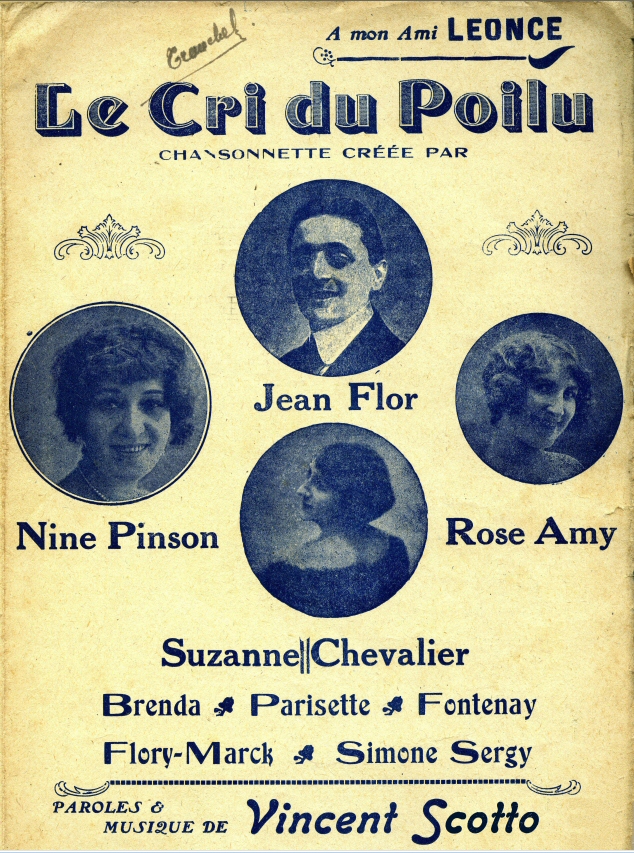
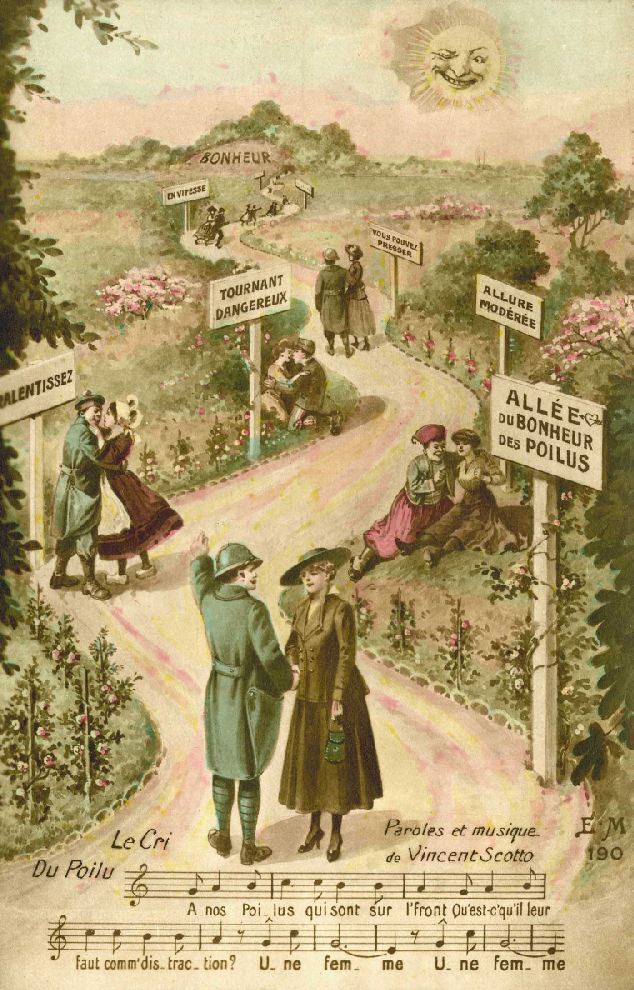
|
|
|
La chanson de Craonne
Quand au bout d´huit jours, le r´pos terminé,
On va reprendre les tranchées, Notre place est si utile Que sans nous on prend la pile. Mais c´est bien fini, on en a assez, Personn´ ne veut plus marcher, Et le cœur bien gros, comm´ dans un sanglot, On dit adieu aux civ´lots. Même sans tambour, même sans trompette, On s´en va là-haut en baissant la tête. Adieu la vie, adieu l’amour, Adieu toutes les femmes. C’est bien fini, c’est pour toujours, De cette guerre infâme. C’est à Craonne, sur le plateau, Qu’on doit laisser sa peau, Car nous sommes tous condamnés, Nous sommes les sacrifiés ! Huit jours de tranchées, huit jours de souffrance ! Pourtant on a l’espérance Que ce soir viendra la r’lève Que nous attendons sans trêve. Soudain dans la nuit et dans le silence On voit quelqu’un qui s’avance C’est un officier de chasseurs à pied Qui vient pour nous remplacer Doucement, dans l’ombre, sous la pluie qui tombe, Les petits chasseurs vont chercher leurs tombes. C’est malheureux d’voir, sur les grands boulevards, Tous ces gros qui font la foire Si pour eux la vie est rose, Pour nous, c’est pas la mêm’ chose. Au lieu d‘se cacher, tous ces embusqués F’raient mieux de monter aux tranchées Pour défendre leurs biens, car nous n’avons rien, Nous autres, les pauvr’s purotins. Tous les camarades sont enterrés là Pour défendr’ les biens de ces messieurs-là. Ceux qu’ont l’pognon, ceux-là r’viendront, Car c’est pour eux qu’on crève. Mais c’est fini, car les troufions Vont tous se mettre en grève. Ce s’ra votre tour, messieurs les gros, De monter sur le plateau. Car si vous voulez fairela guerre Payez-la de votre peau ! |
The Song of Craonne
When after eight days, the rest is over,
We go back to the trenches, Our place is so useful That without us we're screwed. But it is well finished, we have enough, No one wants to walk anymore, And the heart very big, as in a sob, We say goodbye to the civilians. Even without drum, even without trumpet, One goes up there, lowering the head. Farewell life, farewell love, Farewell all women. It's over, it's forever, Of this infamous war. It is in Craonne, on the plateau, That we must get killed, 'Cause we're all doomed We are the sacrificed! Eight days of trenches, eight days of suffering! Yet we have the hope That tonight will come the relief That we are waiting for without truce. Suddenly in the night and in the silence We see someone coming forward It is an officer of infantry Who is coming to replace us Slowly, in the shadow, under the falling rain, The little chasseurs go toward their graves. It is unfortunate to see, on the Grand Boulevards, All these rich people who whoop it up If for them the life is a bed of roses, For us, it is not the same thing. Instead of hiding, all these shirkers Would do better to go to the trenches To defend their goods, because we have nothing, We, the poor wretches. All the comrades are buried there To defend the property of these gentlemen. Those who have the dough will come back, Because it is for them that we die. But it's over, because the troops Will all go on strike. It will be your turn, gentlemen moneybags, to get on the plateau. For if you want to fight the war Pay for it with your skin! |
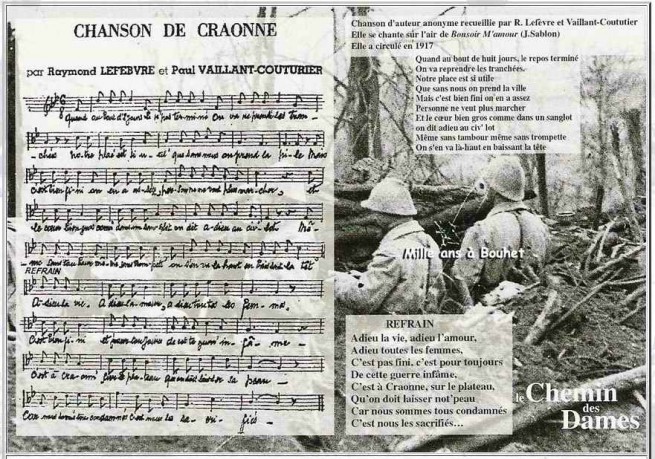
|
|
|
Les tourneuses d’obus
On n’est pas inutiles,
On n’est pas embusquées, On a les bras dans l’huile, On est dures au métier. Nous avons des ampoules aux mains Et nous somm’s des femm’s pas fragiles, C’est nous qui f’sons dès le matin Des soixant’ quinze ou des cent vingt, Poussant l’burin ! Nous somm’s les tourneuses d’obus, Les mômes des poilus, On n’est pas des duchesses, On peut nous voir dès le matin Nous cavaler au turbin. Et tout le jour à l’atelier On cisèle l’acier Comm’ des hommes à la r’dresse. On peut dir’ qu’ell’s jettent leur jus Les tourneuses d’obus ! Nous gagnons la brigfaille Des vieux à la maison. L’homme est à la bataille, Il faut bien qu’nous bouffions !! En donnant la crout’ aux moutards C’est nous qui faisons la mitraille Que nos gars envoient aux boch’mards Pour leur z’y rentrer dans le lard Ou bien autr’ part ! Quand la guerr’ s’ra finie, Qu’nos Poilus reviendront, Notre tâche accomplie, À la gar’ nous irons. Nous leur dirons plein’s de fierté : « On va reprendre notre vie, « Reprends ta place à l’atelier, « Nous, les femm’s on r’tourn’ au foyer « Pour te choyer ! » |
Women Shell Turners
We are not useless,
We do not shirk, We have our arms in oil, We are hard at work. We have blisters on our hands And we are not fragile women, We are the ones who make in the morning Seventy-five or one hundred and twenty, Pushing the chisel! We are the women shell turners The girls of the poilus, We are not duchesses, You can see us in the morning We run to the grind. And all day long in the workshop We chisel the steel Like tough men. We can say that they're really quite something The women shell turners! We win the grub For the old folks at home. The man is in the battle, We have to eat! By giving the crust to the kids It is we who make the grapeshot That our guys send to the Boches To kick them into the beer-belly Or somewhere else behind! When the war is over, That our Poilus will return, Our task accomplished, To the station we will go. We will say to them full of pride: "We will take back our life, "Take back your place in the workshop, "We women will return home "To pamper you!" |
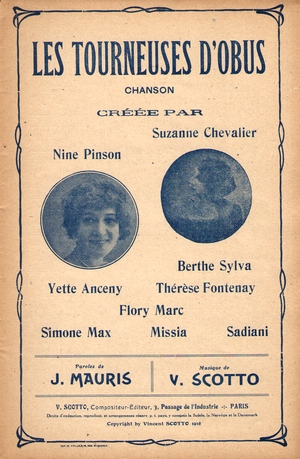
|
|
|
Nénette et Rintintin
Ell’ s’appelait Nénette,
Il s’app’lait Rintintin, C’était un’ midinette, C’était un p’tit gamin. Tous les jours on voyait sur l’mêm’ chemin Nénette et Rintintin. Et Rintintin, la tenant par la main, Lui répétait : « J’ t’aim’ bien, ma p’tit’ Nénétte » Et la Nénette, avec son air mutin, Lui répondait : « J’ t’ ador’, mon p’tit Tintin ! » Un soir, le long d’la Seine Ils s’ prom’naient tranquill’ment, Quand v’la l’ cri d’ la sirène Qui r’tentit subit’ment… Les sergents d’ vill’ criaient : « Pressons le pas, « Les goss’s, v’la les Gothas ! » Mais Rintintin disait : « Oh ! Ça va bien ! « On s’en fait pas pour ça, pas vrai, Nénette ? » Et la Nénett’ reprenait : « C’est certain : « On n’a pas peur, nous deux, pas, Rintintin ? » Mais v’là qu’au coin d’un nuage, Ils aperçoiv’nt soudain Un Boch’ qui, d’un virage, S’am’nait sur eux grand train. Tous deux pensèr’nt : « Pour sûr il nous a vus, Ça y est, on est fichus ! » Mais Rintintin disait : « Ben, c’est l’ destin, « On va mourir ensembl’ dis, ma Nénette ? » Et la Nénett’ répondant : « Ça fait rien, On mourira, tous deux, pas mon Tintin ? » Derrièr’ ses gross’s lunettes, Roulant d’affreux calots, L’ Boche allait, la sal’ bête, Les tuer, les pauvr’s loupiots, Lorsque l’ gamin lui cria : « Hé ! fourneau ! « Acré ! V’la Clémenceau… » La d’ssus v’la l’ Boch’ qui r’tourne son machin, Sans prendre l’temps d’fair’ du mal à Nénette, Et v’la l’grand lâch’ qui fil’ comme un lapin, Sans pouvoir tuer Nénett’ ni Rintintin. Bientôt, car tout s’ répète, On connut c’t’ histoir’-là, Qu’ Rintitin et Nénette Faisaient peur aux Gothas C’est d’puis c’ temps-là qu’ les femm’s, pour parer l’ coup, Les portent à leur cou ! Allons, mesdam’s, qui n’a pas son pantin, Son p’tit fétich’, son Tintin, sa Nénette ? Ça s’ fait en laine, en coton, en satin. Oui, qui n’a pas Nénette et Rintintin ? |
Nénette et Rintintin
Her name was Nénette,
His name was Rintintin, She was a young shopgirl, He was a little kid. Every day we saw on the same road Nénette and Rintintin. And Rintintin, holding her by the hand, Repeatedly said to her: "I love you, my little Nénette". And Nénette, with her impish air replied: "I love you, my little Tintin!" One evening, along the Seine They were walking quietly, When the cry of the air-raid siren Suddenly resounded… The policemen shouted: "Let's hurry up, "Kids, here come the Gothas!" But Rintintin said, "Oh, it's all right! "We don't have to worry about that, do we, Nénette?" And Nénette would pick up, "That's for sure: "We're not afraid, are we, Rintin?" But then, at the corner of a cloud, They suddenly see A Boche who, from a bend in the road, Coming at them with great speed. Both thought: "For sure he saw us, That's it, we're done for!" But Rintintin said, "Well, this is fate, "We're going to die together, aren't we, my Nénette?" And Nénette answered: "It doesn't matter, We'll die, both of us, won't we, my Tintin?" Behind his big glasses, Rolling ugly peepers, The Boche was going, the dirty beast, To kill them, the poor kids, When the boy shouted: "Hey! stove![?] "dash it all! here comes Clémenceau…" Then, the Boche turned his thing over, Without taking the time to hurt Nénette, And here's the big coward who runs like a rabbit, Without being able to kill Nénette nor Rintintin. Soon, because everything is told, We knew this story, That Rintitin and Nénette Scared the Gothas. Since that time, the women, to parry the blow, Wear them around their necks! Come on, ladies, who doesn't have his puppet, His little fetish, his Tintin, his Nénette? It is made of wool, cotton, satin. Yes, who doesn't have Nénette and Rintintin? |
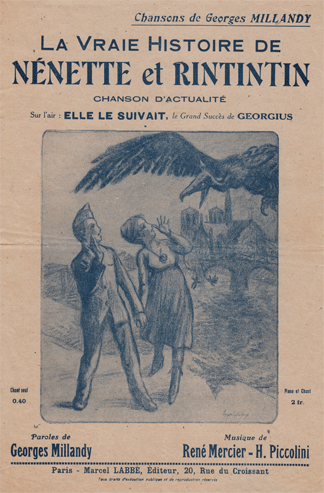
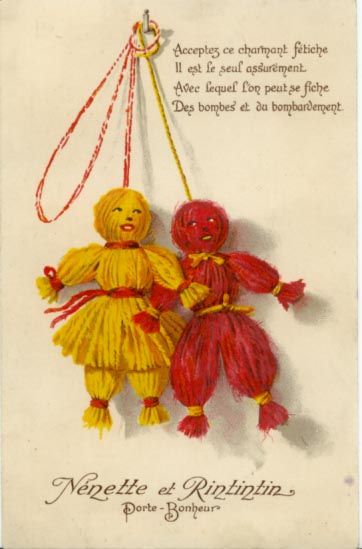
Unfortunately, we did not find any recording corresponding to this version of the song |
|
|
C’est le Poilu
Quand sonnaient les heures d’alarmes,
Quand, écrasés, nos frères d’armes Fuyaient devant l’envahisseur, Quell’s sont ces glorieuses cohortes Venues pour leur prêter main-forte, Qui enrayaient le flot vainqueur? Résolument, bravant la mort, Toujours prêt pour le grand effort. C’est le Poilu, soldat de France, Qui sur la brèche se dressait. L’allié connaissait sa vaillance. En son cœur l’espoir renaissait. C’est le Poilu, soldat de France, Qui sur la brèche se dressait. Qui rachetait les défaillances ? C’est le Poilu, le p’tit soldat français ! Et durant ces heures tragiques Le profiteur repus, cynique, Fréquentait la boîte de nuit. À lui les veillées érotiques Et les tangos épileptiques, À lui la gaieté et les ris. Ah ris toujours ! ah ris encore ! Quelqu’un pour toi brave la mort. C’est le Poilu, soldat de France Qui au créneau là-bas veillait, Son corps rompu à l’endurance Sous la rafale se courbait. C’est le Poilu, soldat de France. Qui au créneau là-bas veillait Sur tes nuits d‘orgies de bombances ? C’est le Poilu, le p’tit soldat français ! Vous, renégats, rois des bassesses, Traîtres soldés dont les prouesses Illustrèrent la Haute Cour ! Vous avez souillé notre histoire, Vous avez maculé la Gloire Pour de l’or ou de vils amours. De ce marché, trafic sans nom, Qui donc a payé la rançon ? C’est le Poilu, soldat de France, C’est le Poilu qui s’immolait. Vous avez vendu vos consciences, De son sang il les rachetait. C’est le Poilu, soldat de France, C’est le Poilu qui s’immolait. Celui dont le sang crie vengeance, C’est le Poilu, le p’tit soldat français ! |
That's the Poilu
When the hours of alarm sounded,
When, crushed, our brothers in arms Fled before the invader, What are these glorious cohorts Who came to lend them a hand, Who stopped the victorious flood? Resolutely, braving death, Always ready for the great effort. It is the Poilu, soldier of France, Who stood in the breach. The ally knew his valor. In his heart hope was reborn. It is the Poilu, soldier of France, Who stood in the breach. Who redeemed the failures? It is the Poilu, the little French soldier! And during these tragic hours The greedy, cynical profiteer, frequented the nightclub. To him the erotic evenings And the epileptic tangos, To him the gaiety and the laughter. Ah laugh always! ah laugh again! Someone for you braves death. It is the Poilu, soldier of France Who at the crenel over there kept watch, His body inured to endurance Under the burst curved. It is the Poilu, soldier of France. Who at the crenel there watched over On your nights of orgies, of feasts? It is the Poilu, the little French soldier! You, renegades, kings of vileness, Bribed traitors whose prowess Illustrated the High Court! You have soiled our history, You have sullied the Glory For gold or vile loves. Of this market, loathsome traffic, Who paid the ransom? It is the Poilu, soldier of France, It is the Poilu who immolated himself. You sold your consciences, With his blood he redeemed them. It is the Poilu, soldier of France, It is the Poilu who sacrificed himself. He whose blood cries out for vengeance, It is the Poilu, the little French soldier! |
|
La butte rouge
Sur cette butte-là y'avait pas d'gigolettes
Pas de marlous ni de beaux muscadins. Ah c'était loin du Moulin d'la Galette, Et de Paname qu'est le roi des patelins. C'qu'elle en a bu du bon sang cette terre, Sang d'ouvriers et sang de paysans, Car les bandits qui sont cause des guerres N'en meurent jamais, on n'tue qu'les innocents ! La butte rouge, c'est son nom, l'baptême s'fit un matin Où tous ceux qui grimpaient roulaient dans le ravin. Aujourd'hui y'a des vignes, il y pousse du raisin, Qui boira d'ce vin-là, boira l'sang des copains. Sur cette butte-là on n'y f'sait pas la noce Comme à Montmartre où l'champagne coule à flots, Mais les pauvr's gars qu'avaient laissé des gosses Y f'saient entendre de terribles sanglots. C'qu'elle en a bu des larmes cette terre, Larmes d'ouvriers et larmes de paysans, Car les bandits qui sont cause des guerres Ne pleurent jamais, car ce sont des tyrans ! La butte rouge, c'est son nom, l'baptême s'fit un matin Où tous ceux qui grimpaient roulaient dans le ravin. Aujourd'hui y'a des vignes, il y pousse du raisin, Qui boit de ce vin-là, boit les larmes des copains. Sur cette butte-là, on y r'fait des vendanges, On y entend des cris et des chansons. Filles et gars doucement qui échangent Des mots d'amour qui donnent le frisson. Peuv’nt-ils songer, dans leurs folles étreintes, Qu'à cet endroit où s'échangent leurs baisers, J'ai entendu la nuit monter des plaintes Et j'y ai vu des gars au crâne brisé ! La butte rouge, c'est son nom, l'baptême s'fit un matin Où tous ceux qui grimpaient roulaient dans le ravin. Aujourd'hui y'a des vignes, il y pousse du raisin. Mais moi j'y vois des croix portant l'nom des copains… |
The Red Hillock
On this hillock, there were no gigolettes
No pimps nor handsome popinjays Ah! It was far from the Moulin de la Galette, And of Paname which is the king of all villages. What it drank of good blood this ground, Blood of workers and blood of peasants, Because the bandits who cause wars Never die, only the innocent are killed! The red hillock, that’s its name, baptized one morning When all those who climbed rolled into the ravine. Today there are vines, there grows grapes, Who drinks this wine drinks the blood of my buddies. On this hillock, we did not party there, As they do in Montmartre where champagne is pouring, But the poor guys who had left kids There made hear terrible sobs. What it drank tears this ground, Tears of workers, tears of peasants, Because the bandits who cause wars Never cry, because they are tyrants! The red hillock, that’s its name, baptized one morning When all those who climbed rolled into the ravine. Today there are vines, there grows grapes, Who drinks this wine, drinks the tears of my buddies. On this hillock there is a new harvest, You can hear laughs and songs. Girls and boys gently exchanging Words of love, which make you shiver. Can they imagine, in their wild embraces, That in this place where they exchange kisses, At night, I heard moanings rising And there, I saw guys with broken skulls! The red hillock, that’s its name, baptized one morning When all those who climbed rolled into the ravine. Today there are vines, grapes grow there. But I see crosses with the names of my buddies… |
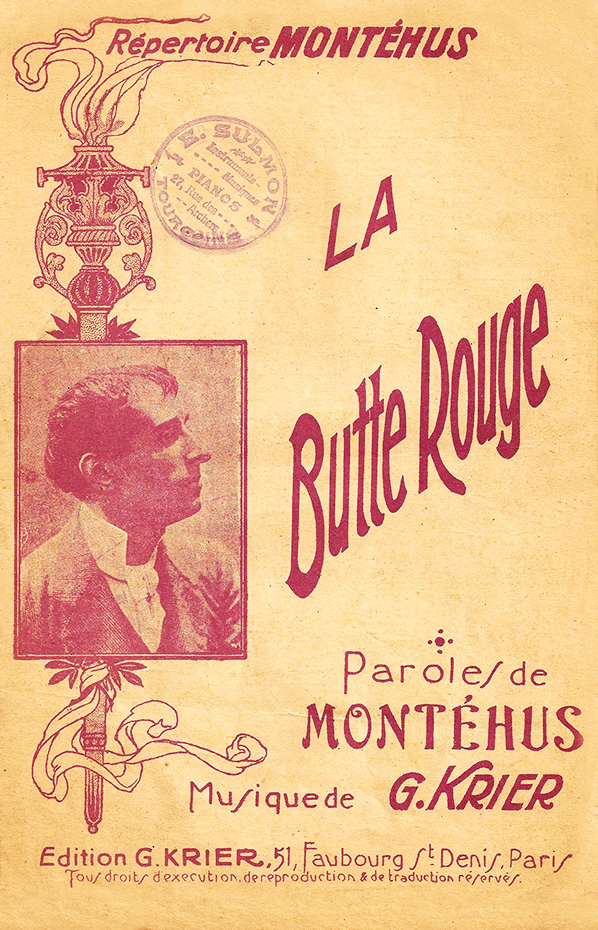
Sung by Francis Marty (1931 ?) |
|